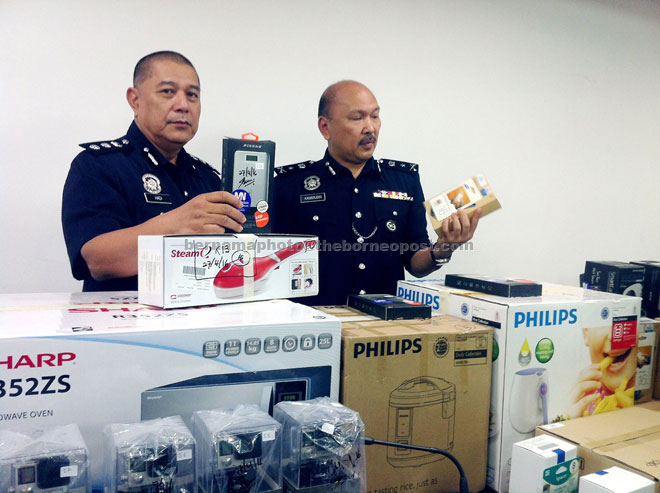
Mohd Kamarudin (right) and another officer show the seized items during a press conference. — Bernama photo
KUALA LUMPUR: The police have crippled a syndicate which hacked into online company purchasing systems to obtain goods using fake credit cards and resell them at cut-rate prices, with the arrest of 11 people last month.
The suspects comprising nine men and two women raked in about RM1 million in connection with their false transactions.
They have been remanded under Section 5 of the Computer Crimes Act 1997.
Commercial Crime CID (Multimedia and Cyber Crime Investigation) deputy director SAC Mohd Kamarudin Din Md Din said the suspects were picked up here, Selangor, Pahang and Kelantan during a three-day operation, ‘Op Helang 3/16’ which began on April 25.
He said the police seized computers and telephones believed to have been used in the syndicate’s cheating activities, and goods which were fraudulently purchased from victims to facilitate investigations.
“Based on preliminary investigations, the syndicate was believed to have been active in the four locations since September last year.
“Its modus operandi was to purchase products online using fake credit cards and resell them at cut-rate prices on other websites, including smart applications,” he told a media conference here yesterday.
Mohd Kamarudin said the syndicate targeted popular companies offering products like electronic goods, cosmetics, computer games and instant food.
“They will use the data of fake credit cards to pay for products purchased.
“When the transactions fail, they will use an application which can intercept the backhand codings showing ‘failed’ and changing them to ‘successful’.
“Upon receiving the ‘successful’ transactions, the suppliers will deliver the products to the buyer, not knowing the transactions are invalid,” he said, adding that the syndicate also used fake or non-existent addresses to receive the products it had ‘purchased’.
When the courier failed to go to a certain location, it was instructed to deliver the packages to another location fixed by the syndicate, said Kamarudin.
He said upon receiving the products, the syndicate advertised them in websites and social media to reap the profits. — Bernama
